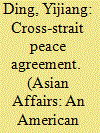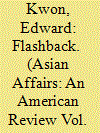| Srl | Item |
| 1 |
ID:
113043


|
|
|
|
|
| Publication |
2012.
|
| Summary/Abstract |
In spite of the fact that substantial progress has been made in the improvement of relations between China and Taiwan, 1
there have been no talks on sensitive political issues. Beijing's proposal for a cross-strait peace agreement is put on hold. Disagreement over the sovereignty of one China and the political reality in Taiwan have conspired to create an apparent impasse and contributed to an indefinite delay of the negotiations. At the moment, a large section of Taiwanese people do not seem to want this peace agreement. The ruling Chinese Nationalist Party (KMT) cannot afford to start negotiations without a strong domestic consensus. This article examines the political situation in Taiwan, analyzes the main obstacles to reaching a cross-strait peace agreement, and explores possible solutions.
|
|
|
|
|
|
|
|
|
|
|
|
|
|
|
|
| 2 |
ID:
113044


|
|
|
|
|
| Publication |
2012.
|
| Summary/Abstract |
This paper investigates financial liberalization in Mexico and South Korea from a comparative international political economy perspective. Though the two countries have a different political economy background, their experiences with financial repression and liberalization were similar, as was the manner in which they handled the subsequent huge inflow of capital. During the process of financial liberalization, both governments had their policy autonomy undermined by strong domestic interest groups as well as by influential international actors. Similar situational effects also prevailed during these two countries' financial crises: both experienced surges of international financial capital, had presidential elections during the crisis, and joined the OECD around that time. This paper sheds light on how the two countries experienced macroeconomic imbalances and financial crisis as a result of financial liberalization. The experience suggests meaningful lessons for other developing countries regarding the policy dilemmas that can arise from financial liberalization.
|
|
|
|
|
|
|
|
|
|
|
|
|
|
|
|
| 3 |
ID:
113045


|
|
|
|
|
| Publication |
2012.
|
| Summary/Abstract |
Does fiscal decentralization empower sub-national governments to raise sufficient revenue from local sources thereby reducing their dependence on the national government? This paper addresses this question by focusing on Indonesia's most recent decentralization policy and assessing and analysing the role of local governments in this regard. Based on data collected from two different locations in Eastern Indonesia the paper shows that the dependency of local authorities on central government is excessive and that the share of local revenue in regional budget has remained rather small. It also shows that while the fiscal power granted to local governments is limited, a combination of politico-economic and contextual factors has further undermined the prospect of revenue mobilisation at the local level.
|
|
|
|
|
|
|
|
|
|
|
|
|
|
|
|